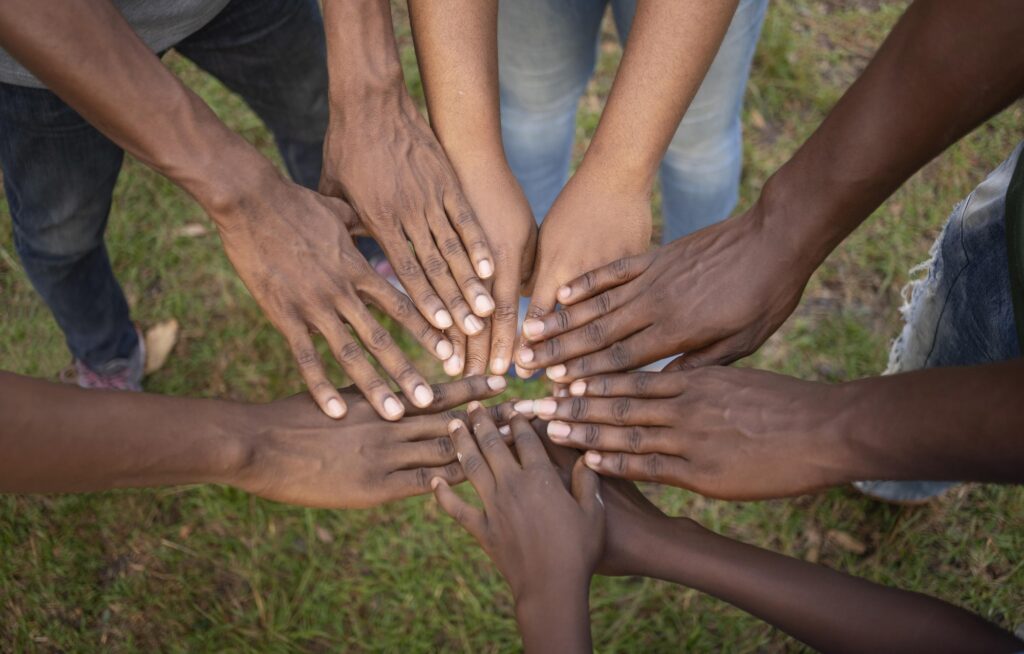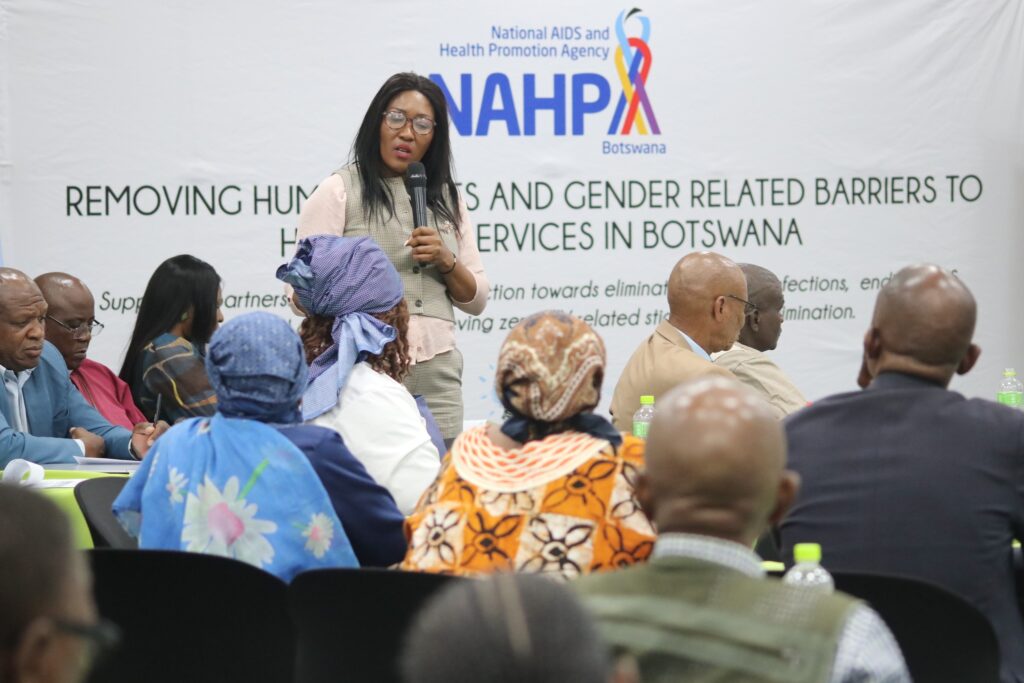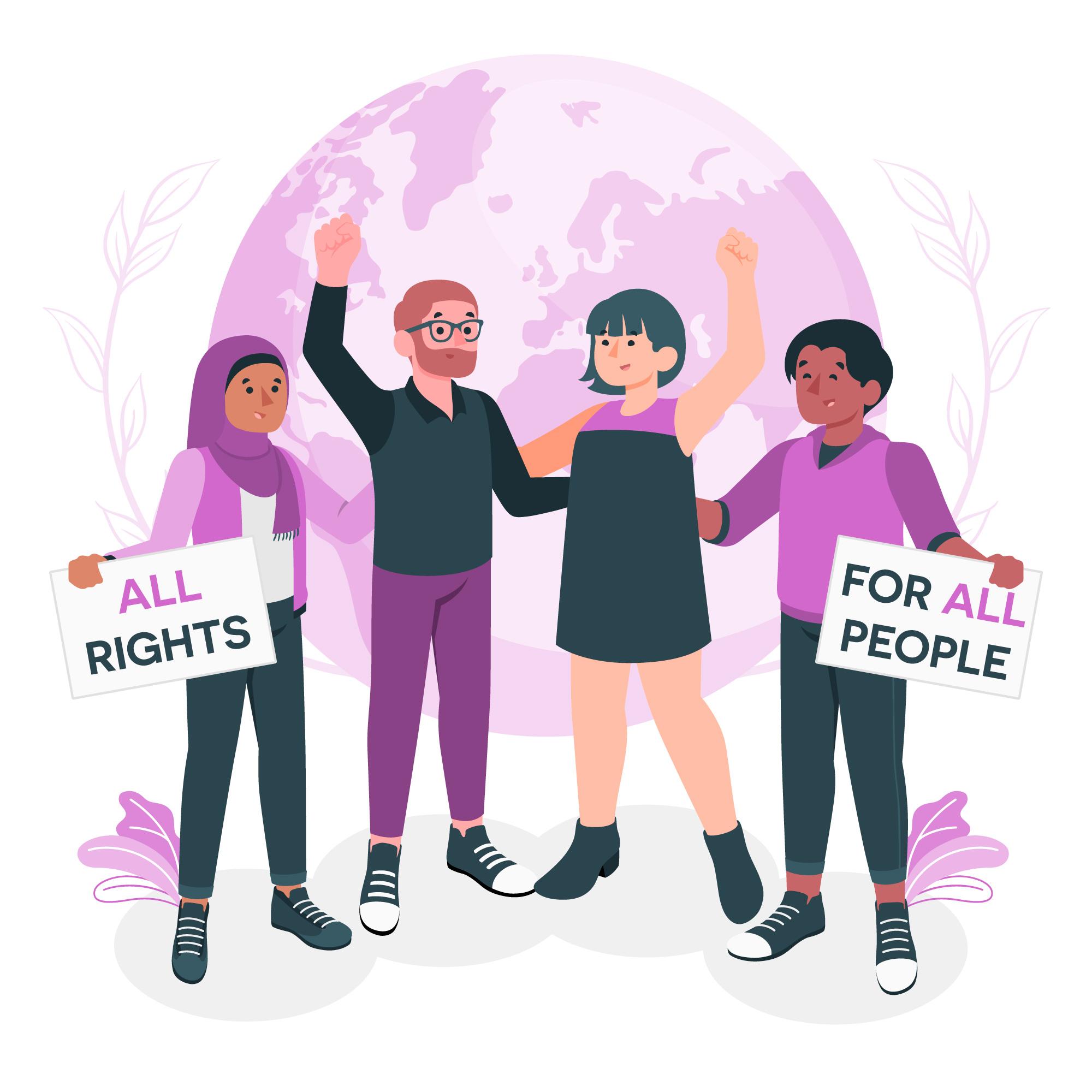hUMAN
rIGHTS
Protecting, promoting and fulfilling human rights is the foundation of what we do. Everyone is entitled to be treated with respect and dignity.
In striving to ensure that the right to health is made a reality in Botswana, special attention should be paid to the human rights related barriers that make it difficult for all vulnerable groups to have access to the prevention, care and treatment services that they need.
These human rights barriers are rooted in a number of issues. These could include stigma and discrimination on the basis of disability, sex, gender identity or sexual orientation among others. Access could also be made difficult by social issues such as gender based violence and gender inequality. Human rights barriers may also be perpetuated in the form of harmful practices, policies and laws that are used in the
health care setting to the detriment of vulnerable groups such as mandatory HIV/AIDs testing and lack of informed consent.
In the face of these challenges, our work, seeks to cultivate a human rights based approach to the provision of health care, ensuring that it is available, acceptable and accessible to all, regardless of their background or standing in society. Our work also revolves around ensuring that the health care provided is of good quality and that the underlying determinants of health such as safe drinking water, food and shelter are equally advocated for.


Once a human rights based approach to the provision of care is stressed, vulnerable groups such as women, children, people living with HIV/AIDs (PLWHIV), people with disabilities (PWDs), LGBTI + persons, sex workers, migrant workers and prisoners, among others, will be catered for in general health response. This is the center of all areas of our work.
“Where, after all, do universal human rights begin? In small places, close to home – so close and so small that they cannot be seen on any maps of the world. Yet they are the world of the individual person; the neighborhood he lives in; the school or college he attends; the factory, farm or office where he works. Such are the places where every man, woman and child seeks equal justice, equal opportunity, equal dignity without discrimination. Unless these rights have meaning there, they have little meaning anywhere.”
– Eleanor Roosevelt
- Providing awareness to communities on their basic human rights so that they are able to recognize human rights violations and seek assistance;
- Linking clients with other social services to ensure that the other determinants of health are catered for;
- Offering a range of legal services in the event of human rights violations;
- BONELA sits on the National Gender Technical Working Group that supports the Department of Gender Affairs on gender issues and GBV. The TWG works to promote gender equality, equity, inclusion, and gender-responses to policies, laws, and regulations. This entails development of strategies to combat GBV, advising the Department of Gender Affairs on policy and law reform, and monitoring the implementation of existing gender related laws and policies in Botswana.
- Training of members within the health, social service, police and tribal administration sectors on the human rights based approach to service provision;
- Building Community Linkages among leaders such as Dikgosi (Traditional leaders), Balaodi (District Commissioners), Teachers, Priests/Pastors (Religious leaders, Health and Social Workers as well as the Police to establish a working ecosystem on the protection and promotion of human rights;
- Contributing towards various legal assessments in relation to laws and policies, to identify gaps and make recommendations as to what is required; and
- Advocating for the inclusion of the right to health in the Constitution of Botswana, together with other complementary rights, such as the right to work, education, water and shelter.
- In collaboration with the Botswana Red Cross Society, UNHCR and the Dukwi Refugee Advisory Committee, BONELA successfully spearheaded an advocacy campaign from 2007–2010 to compel the government to provide HAART to refugees in Botswana. Currently, the government has allowed access to ARVs for refugees in the national programme and other non-citizens.
- BONELA set legal precedent through strategic litigation for the government to provide ARVs to foreign prisoners. The court passed a moratorium in 2014 ordering the government to provide HAART to foreign inmates. The judgement by the High Court of Botswana regarding the case on Access to ARVs for foreign prisoners is a litmus case and testament to the organisation’s commitment and capacity to advocate and claim people ‘s rights.
- Educating communities on dismantling harmful attitudes that perpetuate violence, non-inclusivity and discrimination;

- BONELA actively participated in abolishing the Marital Power Act 2004 that gave a husband power over his wife.
- BONELA is currently conducting a campaign around removing harmful cultural norms including child marriage.
- BONELA conducted an analysis of existing policies on SRH and bodily autonomy for AGYW, presented policy briefs to parliamentary sub committees on harmonising laws for AGYW and enabling access to SRH, contributed to the drafting of the National SRH Policy, and actively participated in changing the Penal Code to move the age of sexual consent from 16 to 18 years.

- BONELA and partners advocated for the review of the National Disability Policy to be aligned to the International Convention on the Rights of Persons with Disabilities, and other development frameworks, resulting in the adoption of the revised National Disability Policy by the Botswana National Assembly on the 2nd of September 2021.
- BONELA co-facilitated the 1st (2007) and 2nd (2017) National Legal Environment Assessments (LEA) with Ministry of Health and Wellness (MoHW) and the United Nations Development Programme (UNDP) which identified key legal and policy gaps which create barriers for universal access to TB/HIV services for key and vulnerable populations (KVPs). This strategic report now forms the basis for a prioritised national operational plan to address the recommendations of the LEA to facilitate law and policy reforms i.e., the 2020-2025 National Strategic Plan to Reduce Human Rights – Related Barriers to HIV and TB Services.
- Since 2016 have provided 3054 people across districts and projects with legal services;

